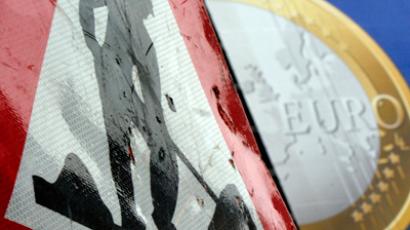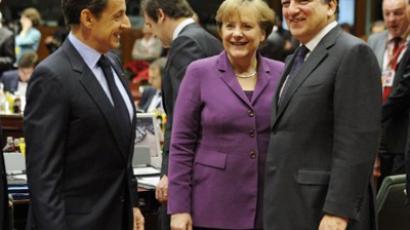Cameron brings EU treaty veto to Parliament
British Prime Minister David Cameron has taken a stand in Parliament to defend his rejection of a new European Union treaty, a move sharply criticized by Deputy Prime Minister Nick Clegg, who said it might reduce Britain to a “pygmy” country.
After being denied specific safeguards for London and the UK, Cameron was the sole EU leader to veto a revised Lisbon treaty that set out to tighten budget rules. “Agreeing to a treaty within a treaty” also creates the risk that other union members will go off and form treaties of their own, he said. The veto was heartily welcomed by British eurosceptics. Among them was Cameron’s own Conservative Party, who praised the PM for showing some “backbone,” while the UK's Liberal Democrats frowned at the move. Speaking about his decision at the House of Commons on Monday, Cameron said he did exactly what he had promised to do, “but apparently, in politics that's surprising these days.” Ahead of the summit, Cameron had stated he wouldn't sign any agreement he wasn't happy with.Deputy PM Nick Clegg, one of the most vigorous critics of Cameron’s decision, did not attend the session at the House of Commons. Explaining his absence, Clegg said he only would have been a “distraction.”Earlier, Clegg said he was “bitterly disappointed” by Cameron’s decision at the EU summit. He claims the move could leave the UK “isolated and marginalized within the European Union.”Labour leader Ed Miliband also supports this view. Speaking at the House of Commons on Monday, he said that Cameron’s refusal to sign the treaty leaves the UK on "the sidelines." Commenting on the concerns that the UK may become marginalized after not signing the treaty, Cameron said that when the UK refused to join the Euro, everyone feared London would lose out to Frankfurt – which, of course, did not happen. RT spoke to historian and author Neil Faulkner, who explained Cameron’s options at the EU summit. “The British elite has been divided since the beginning, really, on the EU: between those who valued greater integration into the European market … and on the other hand, the finance capital the City of London, that feels threatened by the possibility of an EU-imposed tax on financialtransactions,” Faulkner said. “Cameron had a choice: he could have either gone with greater EU integration, or back the speculative profits of the City of London and seek to defend the banks in the City against EU regulation and taxation,” Faulkner explained.Jon Gaunt, a prominent participant of the “Vote UK out of EU” campaign, also believes the UK will pay for Cameron’s decision with isolation. “[Cameron] was right to stand up to the Germans and Sarkozy, but the fact is, we are now indeed more isolated than ever. Still, we pay 51 million pounds a day into the EU, but we have no influence over it whatsoever,” Gaunt told RT.In any case, this is not a full stop in negotiations between the EU and UK.“Germany would want Britain back at the table. Of course, Nick Clegg wants the UK back at that table – Mr. Cameron also often rose back to the center. I don’t know whether he will do that, as the new treaty will not be ratified till March and there are a lot of obstacles to get over. Will Ireland’s constitution allow this new fiscal union? There is every chance of renegotiation,” said Gaunt.Meanwhile, Gerard Lyons, Chief Economist at the Standard Chartered Bank in London, does not think the UK will lose its influence in Europe over Cameron’s refusal to sign the treaty, saying that London is Europe’s international financial center regardless of what happens in Brussels or Frankfurt.“The UK now needs to articulate pretty clearly how it views itself in terms of the globalized, interconnected world economy.And if it does that clearly … then there is no reason why the City of London will do badly, in fact it could do quite well,” Lyons said.














